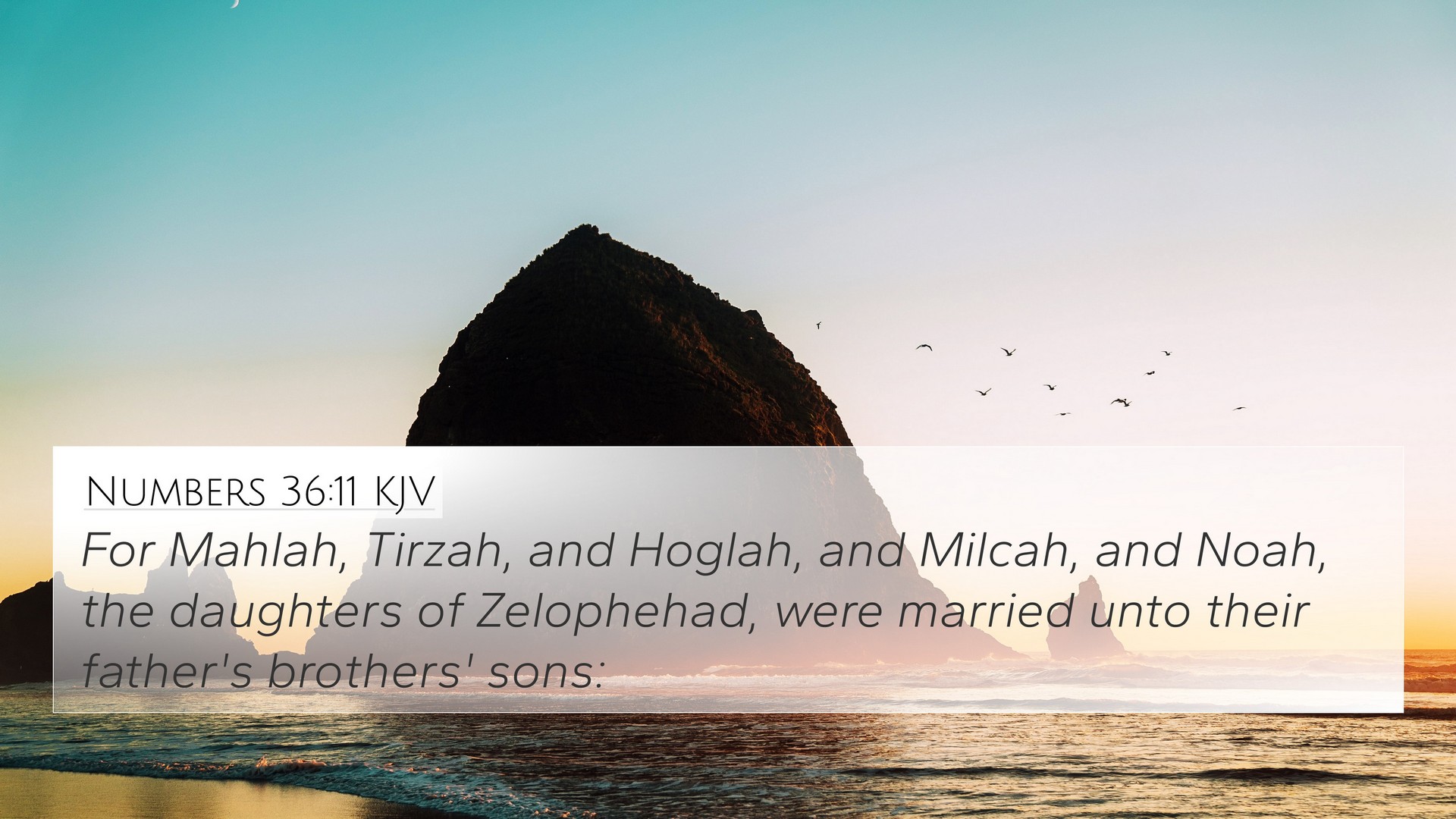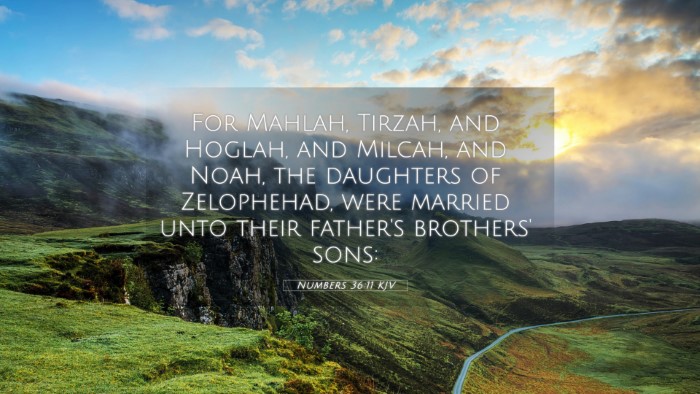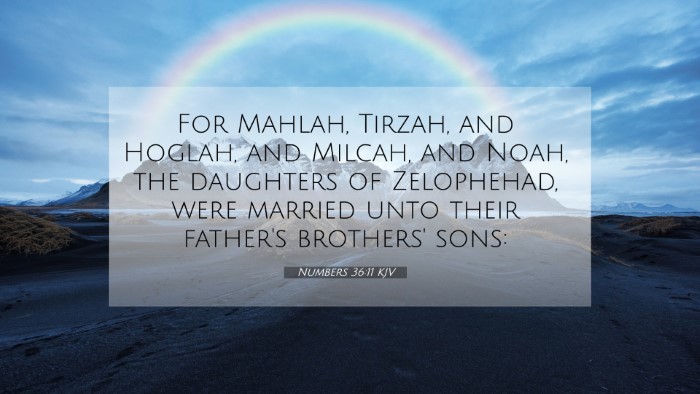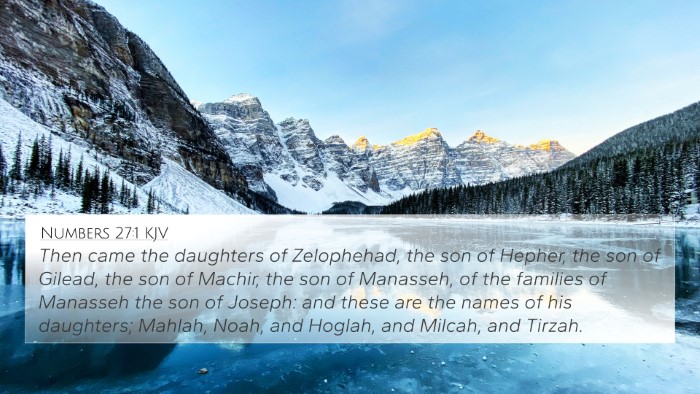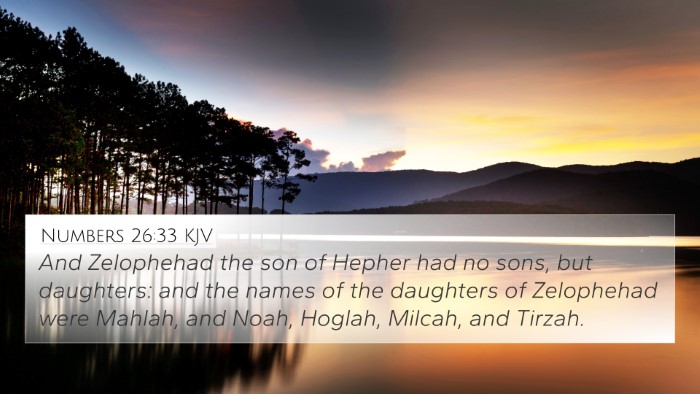Understanding Numbers 36:11
Verse: Numbers 36:11 - "For Mahlah, Tirzah, Hoglah, Milcah, and Noah, the daughters of Zelophehad, were married to the sons of their father's brothers; they were married into the families of the tribe of the sons of Manasseh, the son of Joseph, and their inheritance remained with the tribe of their father's family."
Summary of Meaning
This verse presents a significant moment regarding the inheritance rights of women in ancient Israel. It highlights the marriages of the daughters of Zelophehad to their father's family line, adhering to the tribal inheritance laws while ensuring the legacy of their father's name and possessions. The mention of these specific daughters serves to establish the importance of women's roles in the lineage and the preservation of land ownership within the tribes.
Insights from Public Domain Commentaries
Matthew Henry's Commentary
Matthew Henry emphasizes the importance of maintaining family ties and the rightful inheritance through marriage. He notes that the daughters' decision to marry within their father's tribe was a way to protect their inheritance and reinforces the tribe's stability. This scenario reflects God's providence in ensuring a legacy is preserved, even through women who traditionally had fewer rights.
Albert Barnes' Notes on the Bible
Barnes elaborates on the marital arrangements of the daughters, explaining that their marriages to men from their own tribe were not only a legal necessity but also a divinely sanctioned method to secure family representation and inheritance within Israel. He highlights the significance of these marriages in fulfilling the law of Moses concerning land allotment and inheritance to keep family lands intact.
Adam Clarke's Commentary
Adam Clarke provides context about the broader implications of such marriages, suggesting that they demonstrate a shift in cultural norms regarding women's roles in inheritance. He notes that the daughters' adherence to marrying men from the tribe of Manasseh emphasizes the importance of tribal affiliation and heritage in Israel's socio-legal framework.
Bible Verse Cross-References
- Numbers 27:6-11 - Discusses the inheritance rights granted to the daughters of Zelophehad, establishing their legal standing in matters of land.
- Joshua 17:3-6 - Describes how the daughters received their inheritance among their kin, reinforcing the message from Numbers 36.
- Matthew 1:5 - Mentions Rahab, a woman who also played a crucial role in God's plan through her faith and becomes an ancestor of Jesus, emphasizing women's importance in genealogy.
- Galatians 3:28 - Highlights the equality of all believers in Christ, paralleling the theme of women holding a significant place in God's family.
- 1 Peter 3:7 - Calls for husbands to honor their wives, acknowledging their importance in the family structure.
- Proverbs 31:10-31 - Celebrates the qualities of a virtuous woman, illustrating the positive attributes women bring to their families.
- Ezra 2:61-63 - Relates to the importance of heritage and family ties within the tribe, similar to the sentiments expressed in Numbers.
Thematic Bible Verse Connections
The connections between this verse and others emphasize the importance of inheritance, family dynamics, and the role of women in upholding family legacies. The marriage of the daughters of Zelophehad signifies the intersection of law, cultural practice, and divine intention in the establishment of Israelite heritage.
Cross-Referencing Biblical Texts
This verse provides a clear example of how to utilize tools for Bible cross-referencing to connect themes and laws throughout Scripture. The discussions surrounding inheritance can also be connected to various teachings within the New Testament about equality and the role of women in the faith community. Thus, female figures in the genealogy of Christ and their representation contribute vastly to understanding the broader narrative of redemption and inheritance in the Kingdom of God.
Conclusion
In summary, Numbers 36:11 encapsulates a rich dialogue concerning the rights of women, the importance of marriages for inheritance, and the continuation of tribal identities in Israel. The implications reached far beyond just a family lineage, as they reveal the intricate plan of God for His people, showcasing that every individual, regardless of gender, plays a role in the unfolding of His promises.
